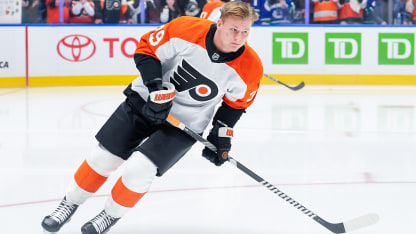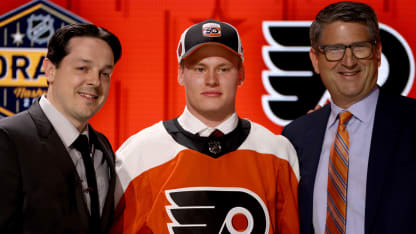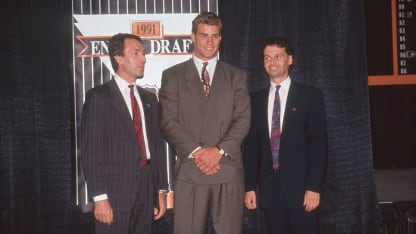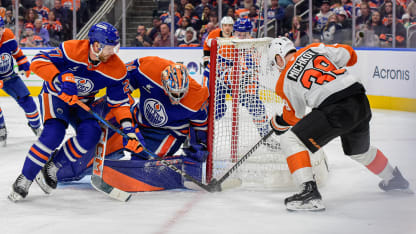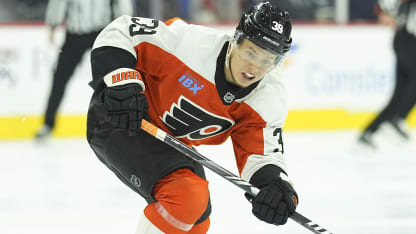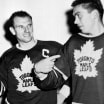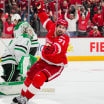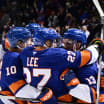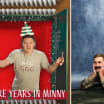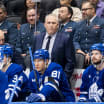That big deal carried into packed stands during training camp at the Coliseum in Voorhees, where the Flyers practiced at the time, including a proliferation of No. 88 jerseys with Lindros' name on them before he even played an NHL game.
"It was absolutely jammed," Recchi said. "There were people everywhere. You could just feel the excitement. He gets on the ice and everybody obviously gets excited. Everything he did, every move he made, people were excited about it and it was just really fun to be part of it."
Lindros was the centerpiece of the marketing campaign for a team that had missed the Stanley Cup Playoffs the previous three seasons, at the time the longest drought in Philadelphia history.
"I remember our staff a week or two after saying when we announced that signing we sold more season tickets than they did after they won the Stanley Cup (in 1974 and ’75)," said Jay Snider, the Flyers president at the time. "It was that level of impact."
Lindros did his best to block out the external noise.
"You feel the pressure," he said. "You feel the desire to go and practice hard and understand that as things go really well in practice, and you stay consistent with it, and you do what you're being asked by the head coach, the assistant coach, the trainers ... you just listen to what they're asking you to do, and you just go ahead and do it. You don't go home and read every little article. You just go and play."
Helping that adjustment was the protection of his teammates.
"I had great guys like Kevin Dineen, he was fantastic," Lindros said. "Dave Brown. Doug Evans was another guy. Keith Acton, he was my [road] roommate my first year. You rely on these older guys because you don't know the routine.
"I didn't know how the rules worked, I didn't know the culture of, what you do, what you don't, apart from wearing a tie and going out there and just minding your p's and q's and going out and playing. I didn't know some of this finer stuff, and what's expected, where you sit on the bus, where you sit on the plane."
Dineen, a decade older at 29 and in his ninth NHL season, became Lindros' landlord when the rookie moved into a room in the home where Dineen and his wife, Annie, lived.
"He basically moved into our attic for a year and a half," Dineen said. "We had an extra buddy around there and we had some great times, the three of us. My wife was attending college at [the University of Pennsylvania], and he and I would get on the train and go over there and sit in on some of her classes."
Lindros was second on the Flyers in 1992-93 with 41 goals and third with 75 points in 61 games, and he finished fourth in voting for the Calder Trophy as NHL rookie of the year.
Philadelphia missed the playoffs, but Lindros became a star on the ice and a pivotal piece for the Flyers in their search to find financing for a new arena; the venue, now called Wells Fargo Center, opened in 1996.
"The interest in premium seats and tickets and everything was tremendous," Snider said. "Our phones were ringing off the hook. In my mind, financially, bringing Eric Lindros to Philadelphia was a winner, no doubt. We sold suites, we sold club seats, we sold advertising. We sold tickets because of Eric Lindros."
Lindros credited the help he got from his teammates, especially Dineen, for his successful first season. He said the Flyers having two other Russia-born players to support Michkov -- goalie Ivan Fedotov and defenseman Egor Zamula -- will be a big help.
"They're going to be just as important off the ice to him as they are on the ice," Lindros said.
* * *
Glickman, who was a Flyers ticket sales representative when Lindros came to Philadelphia, called Michkov's arrival this season "the same, but different. Back then, where that franchise was, [Lindros] was the sole lifeblood that kind of reinvigorated it."
The marketing push around Michkov intentionally has been very different.
"There's been a lot of discussion around that," Glickman said. "How do we bring him in? How are we going to market this and do it the right way? You don't want to upset the apple cart in terms of the balance of what's happening right now. ... [Lindros] was our only star, if you remember. This, the way we look at it, is much more of a team atmosphere. When you look at our billboards, you look at our creative, it's much more a soft landing point to bring [Michkov] in so he can acclimate and whatnot."
So far that plan has worked. Without Michkov being emphasized, among other metrics, sales of his jersey are among the highest on the team.
"I've never seen that many of the jerseys with my name," Michkov said during training camp.
That kind of growth is what has the Flyers excited for what kind of impact Michkov could have as he gets further adjusted to life in North America.
"It's happened organically, which is really cool," Jones said. "It just shows our fans are paying attention and are really looking forward to him playing real games. We're all excited about it. So I'm happy that our fans are pumped up about it."
But much like the soft-touch approach to marketing, the Flyers hockey operations department purposely is keeping the bar low on what kind of impact Michkov can have on the ice.
"We don't see him as a savior," Briere said. "That's certainly not what we're putting on his shoulders. He's 19 years old, he's coming in to learn, to expand his game. We hope that the sky's the limit for him. But we're certainly not expecting him to be the savior of this team."
However, the need for a player of Michkov's skill level is obvious. The Flyers were 27th in scoring last season (2.82 goals per game) and had the worst power play in the NHL (12.2 percent).
Michkov had 41 points (19 goals, 22 assists) in 48 games in the KHL last season, the second-most in league history for a teenage player.
"We are starving for the type of plays that he can make, the instinctive plays that he can make," coach John Tortorella said.
Teammates already have seen it. When defenseman Travis Sanheim was asked about improving the power play, he said, "I'm sure Michkov is going to have something to say about that."
And so far he has. Michkov had scored two goals in six games, each coming on the power play in a 4-3 overtime loss to the Edmonton Oilers on Oct. 15. And Philadelphia had five power-play goals in its first five games; it took them 17 games to score five on the man-advantage last season.
